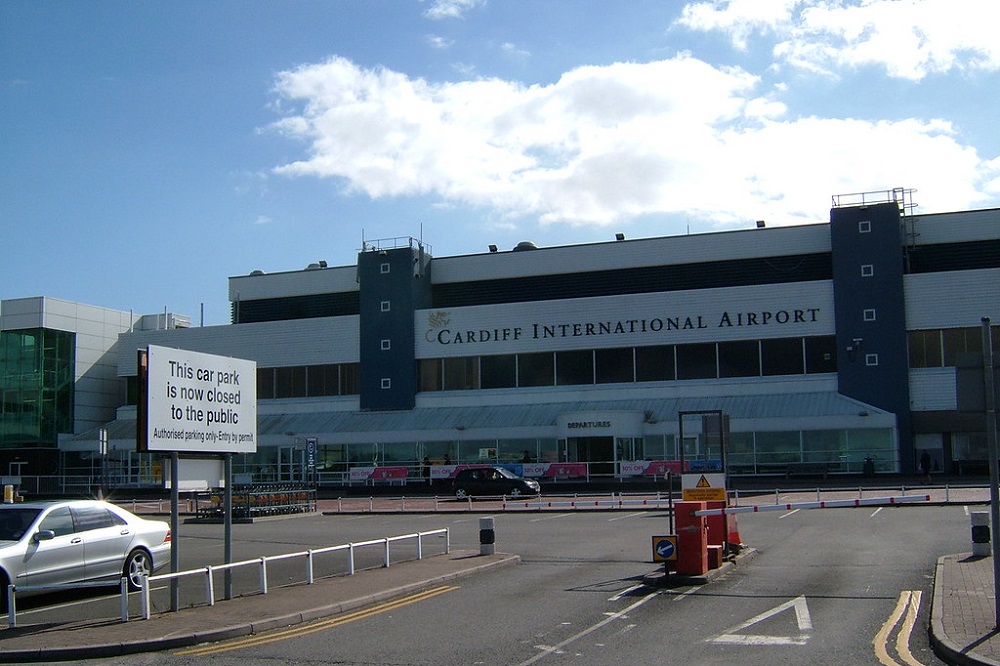News in brief: Auditors confirm dramatic slump in the value of Cardiff Airport

Cardiff Airport is now worth just a fraction of the money the Welsh Government paid for it just under eight years ago.
The dramatic drop in value was revealed in a response to questions by Welsh Conservative Darren Millar MS during the Economy, Skills, and Infrastructure Committee meeting yesterday, as it was confirmed that government auditors value the facility at just £15 million.
The airport was purchased for £52 million in March 2013 and the government has since purchased additional equity totalling £9.3m.
Last week it awarded the facility a grant of £42.6m and wrote off £42.6m in taxpayer-funded loans to help it survive the impact of the Covid pandemic.
The airport has lost more than £40m since its nationalisation, including more than £19m in the year to March 2019. Figures for 2020 are yet to be published.
Economy Minister Ken Skates said last week that Covid-19 had a “catastrophic” impact on the airport, which faced imminent closure if the government had not taken action.
A Civil Aviation Authority (CAA) report shows Cardiff suffered an 87% decline in passenger numbers over the last year, the worst of any UK airport.
Although the site has remained open to support freight and logistics during the pandemic, most staff have been placed on the UK Government’s furlough scheme.
“Scandalous”
“Labour Ministers promised that its purchase of Cardiff Airport would be a good investment yet more than seven years on and hundreds of millions of taxpayers’ funding later and the airport is worth just a fraction of its original purchase price,” Mr Millar said.
“The failure of the Welsh Government to publish information to justify its latest bail out for the Airport is scandalous. Ministers cannot hide behind commercial confidentiality when it comes to taxpayer support in the form of a £42.6 million grant and £42.6 million in debt being written off.
“It is clear that the decision to nationalise Cardiff Airport has placed an albatross around the neck of Welsh taxpayers and without swift action tens of millions more will be lost.”

12 further Covid deaths confirmed in Wales
Twelve further deaths from coronavirus and 195 new cases of the virus have been reported in today’s update from Public Health Wales.
Five of the newly reported deaths were in the Cardiff and Vale health board area and three were in the Betsi Cadwaladr, which covers north Wales.
Cwm Taf Morgannwg and Swansea Bay health boards each recorded two further deaths.
Merthyr Tydfil recorded 26 new cases in the last 24 hours and has the highest case rate in Wales over the last seven days at 94.5 per 100,000 people, up from 86.2 yesterday.
It also has the highest positive test rate at 8.9% per 100,000 tests, a jump from 8.4% yesterday.
The overall case rate for Wales has also risen since yesterday’s report, rising from 41.9 yesterday to 42.8. The positive tests rate remains at 4.5%.
The latest figures confirm 1,034,141 people have now received the first dose and a further 221,902 have had both jabs.

Aston Martin Job losses draw angry response
Both main opposition parties have criticised the Welsh Government following confirmation that up to 200 workers are being made redundant at the Aston Martin car plant in the Vale of Glamorgan.
The luxury car maker has been given a total of £18.8m in grants from the Welsh Government to set up the St Athan plant, which opened in 2018.
Plaid Cymru leader Adam price has called for transparency from the government and called the Job losses “nothing short of a scandal”.
“This is dreadful news for the workers at the St Athan plant, and my thoughts are with them. They will be needing support in the coming weeks and months, particularly as we’re still in a pandemic,” Mr Price said.
“It’s nothing short of a scandal that millions of pounds of taxpayers money has been thrown at Aston Martin by the Labour Welsh Government and the plant in St Athan only for it to be thrown back in their faces by cutting almost 200 jobs.
“The Welsh Government have some serious questions to answer around what happened here, its dealings with Aston Martin, and whether this was an appropriate use of public funds.
Welsh Conservative Shadow Minister for Economy, Russell George MS, said the job losses were “a terrible blow” for workers at the site.
“This economic project was heavily championed by Labour ministers with nearly £20 million of taxpayers’ cash invested and the promise of creating hundreds of new jobs in the region. But it’s failed to deliver,” he added
“Labour ministers must be clear on what’s gone wrong, what demands have been made to Aston Martin on the creation of new jobs in South Wales, and what action has been taken to safeguard Welsh taxpayers’ money.”
A Welsh government spokesman told the BBC it was “working with Aston Martin to support the workforce and we continue to monitor the situation very closely”.
“This news highlights the economic challenges facing many companies, and the incredibly difficult decisions some are now facing,” he said.
“As in all cases of Welsh government support, there are clear conditions relating to the assistance Aston Martin has received and we will consider whether any repayment is appropriate once the outcome of the consultation is known.”

Support announced for beleaguered fishing and aquaculture sectors
The Welsh Government has launched a new £1.3m scheme to help the Welsh fishing and aquaculture sector survive the economic impact caused by leaving the EU and the Covid-19 pandemic.
Welsh fishers have suffered severe trade disruption since the UK/ EU Trade and Co-operation Agreement (TCA) which came into force on 1 January and many of our aquaculture businesses trading in live bivalve molluscs – such as clams and mussels – have suffered a total cessation of trade with EU countries.
This disruption has exacerbated what was already a critical situation for the sector following the closure of hospitality markets due to Covid-19 restrictions.
The new Welsh Seafood Sector Resilience Scheme will make a one-off grant available to eligible Welsh vessel-owning businesses, with the grant equivalent to three months’ vessel costs, capped at £10,000.
The payments will be based on vessel size and the number of corresponding categories.
While similar to the UK Government’s Seafood Response Fund, the qualifying reference period for the Welsh scheme will be longer, providing support to more Welsh fishing businesses who need it
The qualifying criteria will be similar to that of the 2020 Welsh Fisheries Grant.
Aquaculture businesses, including those trading in live bivalve molluscs, will be able to apply for a grant for the first three months of 2021, to provide half of the average of their monthly gross revenue for each month, at a maximum cap of £40,500.
The scheme will be open for applications from 17 March and close on 31 March.
“While I welcome the support provided by the UK Government via its Seafood Response Fund, it only gives partial support for Welsh fisheries and aquaculture businesses,” Lesley Griffiths, the Minister for Environment, Energy and Rural Affairs said.
“As such, I felt it was vital that we give seafood businesses the support they need during these difficult times.
“The support provided will help those eligible to cover their costs during this difficult time, and ensure we have a competitive seafood sector once this crisis has passed.
“We were promised we would not receive ‘a penny less’ after leaving the EU. Clearly this deal has been broken. I will continue to lobby the UK Government to come good on the commitment they made to our fishing and aquaculture sector.”

New funding announced to combat obesity and diabetes in Wales.
More than £6.5million is being invested in combatting obesity and diabetes in Wales, in a bid to support those most likely to be severely affected by the pandemic.
The funding will be targeted at both children and older people to help them in reaching and maintaining a healthy weight.
The new support comes ahead of the publication of the government’s updated 2021-22 Healthy Weight: Healthy Wales (HW:HW) Delivery Plan on 18 March.
The funding will be made up of £5.5m going towards specific HW:HW programmes and £1m towards a pre-diabetes programme, with over £4m spent on developing a system-based approach which will contribute to preventing illness and reducing the impact of poor health and inequality.
More than £600,000 will go towards improving physical inactivity amongst older people, which will help support recovery from the pandemic to encourage healthy behaviours, as well as improving the health of those most likely to be severely affected by coronavirus.
Sport Wales will work with Local Authorities to deliver physical activity opportunities to over 60s who are currently inactive or the least active.
Between 2019-20, there were approximately 192,000 people in Wales with type 2 diabetes – around 7% of the adult population in Wales.
Minister for Mental Health and Wellbeing, Eluned Morgan, said: “We have seen the coronavirus doesn’t discriminate who it targets, but those who are in poor health are much more likely to be severely affected by this awful virus.
“By striving to improve the health of the elderly who are inactive, we can help them reach a healthy weight and reduce the chances of them facing further health problems.”

Welsh Government ‘dictators’ slammed for regional reorganisation plans
Gareth Williams, local democracy reporter
Ministers have been described as “dictators” for pressing on with proposals for another regional layer of government, referred to by councillors on Anglesey as “back door reorganisation”.
The Welsh Government is pressing ahead with plans to create four regional bodies with powers to decide on where to build new housing developments and invest in transport across the respective areas.
The four corporate joint committees (CJCs) would be created in the south-east, south-west, north and mid Wales, while sitting on the committees would be the leaders of every contained council.
But the indirectly elected layer of government would sit above all six northern authorities as well as the Snowdonia National Park.
Having already been condemned by several other authorities, Anglesey used Tuesday’s full council meeting to launch another strong attack.
With the island council having already avoided several efforts to forcibly merge with Gwynedd, and possibly Conwy, most members have been consistent in their determination that Môn should retain its autonomy.
Cllr Aled Morris Jones, a Liberal Democrat who sits with the Annibynnwyr Môn opposition group, said: “Devolution was supposed to bring power closer to the people but we’re seeing the creation of sub-regional bodies that will steal funding from local government.
“Its accepted that the North Wales Economic Ambition Board has worked but now we’re seeing the Welsh Labour Government carry out this power grab for themselves.
“These bodies are totally undemocratic.”
Cllr Bryan Owen added: “This is back door reorganisation and it’ll be a mess as has happened with the health boards.
‘Gerrymandering’
“The Welsh Government, as we know, are experts at gerrymandering but it isn’t acceptable at all as far as I’m concerned.”
Cllr Ken Hughes, meanwhile, urged the council to “make a stand against the dictators,” with opposition to the plans also expressed by Labour group leader, Cllr John Arwel Roberts.
The council leader shared concern over the plans, noting she had expressed her dissatisfaction on several occasions with the Welsh Local Government Association (WLGA).
Cllr Llinos Medi went on to say that her biggest concern was the “mandation,” while acknowledging that the six authorities had worked well together when putting together the North Wales Growth Bid.
“Let the authorities themselves decide if there’s room to work in certain fields and then look at the model, not forcing us in this way,” she concluded.
According to the Welsh Government, the establishment of CJCs will ensure local authorities will be able to do even more in their regions to lead the way in transport planning, land use planning and economic development.
Describing the plans, a spokesperson added: “They offer a consistent approach to strategic planning and delivery at scale, where it makes sense to do so.
“A CJC will not be the only vehicle for local government collaboration, but will provide local authorities with a powerful new tool where appropriate.
“The proposals build on existing successful regional arrangements, such as the North Wales Economic Ambition Board.
“Local Authority Leaders will be CJC members, putting accountability and local leadership at the heart of the decision making process.”

Support our Nation today
For the price of a cup of coffee a month you can help us create an independent, not-for-profit, national news service for the people of Wales, by the people of Wales.





